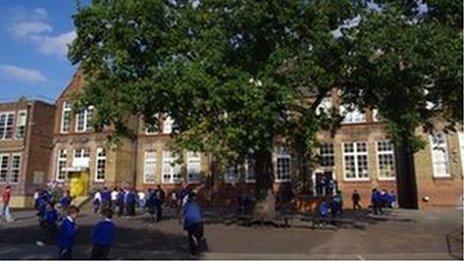Academies could 'fuel social segregation'
- Published
- comments

There are now more than 2,300 academies in England, government data shows
The rising number of schools in England with academy status could fuel rather than improve social segregation, says a report by the Academies Commission.
The report says some academies may "covertly" select pupils by using extra information on families or holding social events with prospective parents.
The commission says academies should publish socio-economic data about who applies and who is offered a place.
Academies are independent school which are funded by the state.
In its report - Unleashing Greatness , external- the Academies Commission says it has received evidence that some popular schools, including academies, attempt to select and exclude pupils.
It says that, while this practice is not new, the fact that academies have greater autonomy over their admissions has "attracted controversy and fuelled concerns that the growth of academies may entrench rather than mitigate social inequalities".
All state schools must abide by an admissions code, which obliges them to admit pupils in a fair way.
But the commission says it has received numerous submissions suggesting "academies are finding methods to select covertly".
The admissions code says that schools cannot interview children or parents, or give priority to children whose parents offer financial or practical support.
"Some witnesses suggested to the commission that schools, including academies, have ways to get around this, such as by holding 'social' events with prospective parents or pre-admission meetings."
'Game-playing'
The report says the rise in the number of academies - 2,309 at the start of this academic year, up from 203 in May 2010 - could see further admissions injustices.
"As the pace and scale of academisation lead to a rapid rise in the number of schools that are their own admission authorities, there is a risk that admissions 'game-playing' may be extended further.
"The current emphases on choice and diversity may go some way to improving the school system in England, but they are likely to hit a ceiling because of the lack of engagement with (or even negative impact on) disadvantaged families."
The commission calls on the Education Secretary, Michael Gove, to develop a system for admissions which allows parents "some independent recourse in terms of their relationship with an individual school, or each academy trust, acting as its own admissions authority".
"This is particularly important in terms of appeals," it says.
The report also recommends school data on admissions to be made widely available and analysed by the Office of the Schools Adjudicator (OSA) to identify any segregation.
"In the interests of demonstrating fairness and accessibility, the commission believes that each academy should publish comprehensive data, including socio-economic data, about who applies to it and who is admitted. "
A spokesman for the Department for Education said: "All admissions authorities - be they local councils or self-governing schools including academies - must comply with our new fair admissions code.
"We specifically changed the law so that anyone who has concerns about how any state-funded school is admitting pupils can formally object to the OSA."
Governors
The Academies Commission report also suggests the role of school governors in academies is becoming even more important and needs "greater attention".
"The commission's evidence gathering suggests there needs to be a radical shift in their capacity, knowledge and attitude if they are to take on both the leadership role expected in an academised system and fulfil their legal responsibilities as directors of charitable companies."
The report also says the recruitment of chairs of governors need to be "far more professional and rigorous", with positions being advertised.

The commission calls on Mr Gove to give parents help in appealing against an academy's admission decision
The commission also says no school should be judged outstanding for leadership unless it can provide evidence of its contribution to system-wide improvement, such as support for the improvement of another local school.
Chair of the commission and former Ofsted chief inspector Christine Gilbert said: "Academisation alone cannot bear the burden of improvement.
"There has to be enough support and challenge in the system, and enough checks and balances, for academies or groups of academies to be able to use the independence they have gained professionally and with moral purpose. "
Shadow education secretary Stephen Twigg said: "This report highlights serious problems with Michael Gove's management of one of Labour's key school improvement programmes.
"The report issues a clear warning on the implementation of the academies policy, echoing Labour's concerns that under this government the schools system is becoming chaotic, impacting on standards and fairness."
Academies are independent, state-funded schools, which receive their funding directly from central government, rather than through a local authority.
They have more freedom than other state schools over their finances, curriculum, length of terms and school days and do not need to follow national pay and conditions for teachers.
Academies were first set up under Tony Blair's Labour government, with the aim of raising standards in under-performing schools in disadvantaged areas.
However, the coalition government extended the programme in 2010 to allow good and outstanding state schools to convert to academy status.
The Academies Commission was set up by the Pearson Think Tank and the RSA charity to examine the implications of the "mass academisation" of state schools.
- Published4 October 2011

- Published15 January 2012

- Published15 March 2012

- Published7 May 2016
